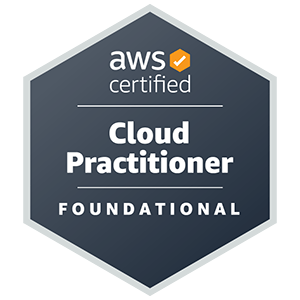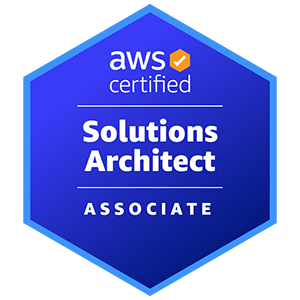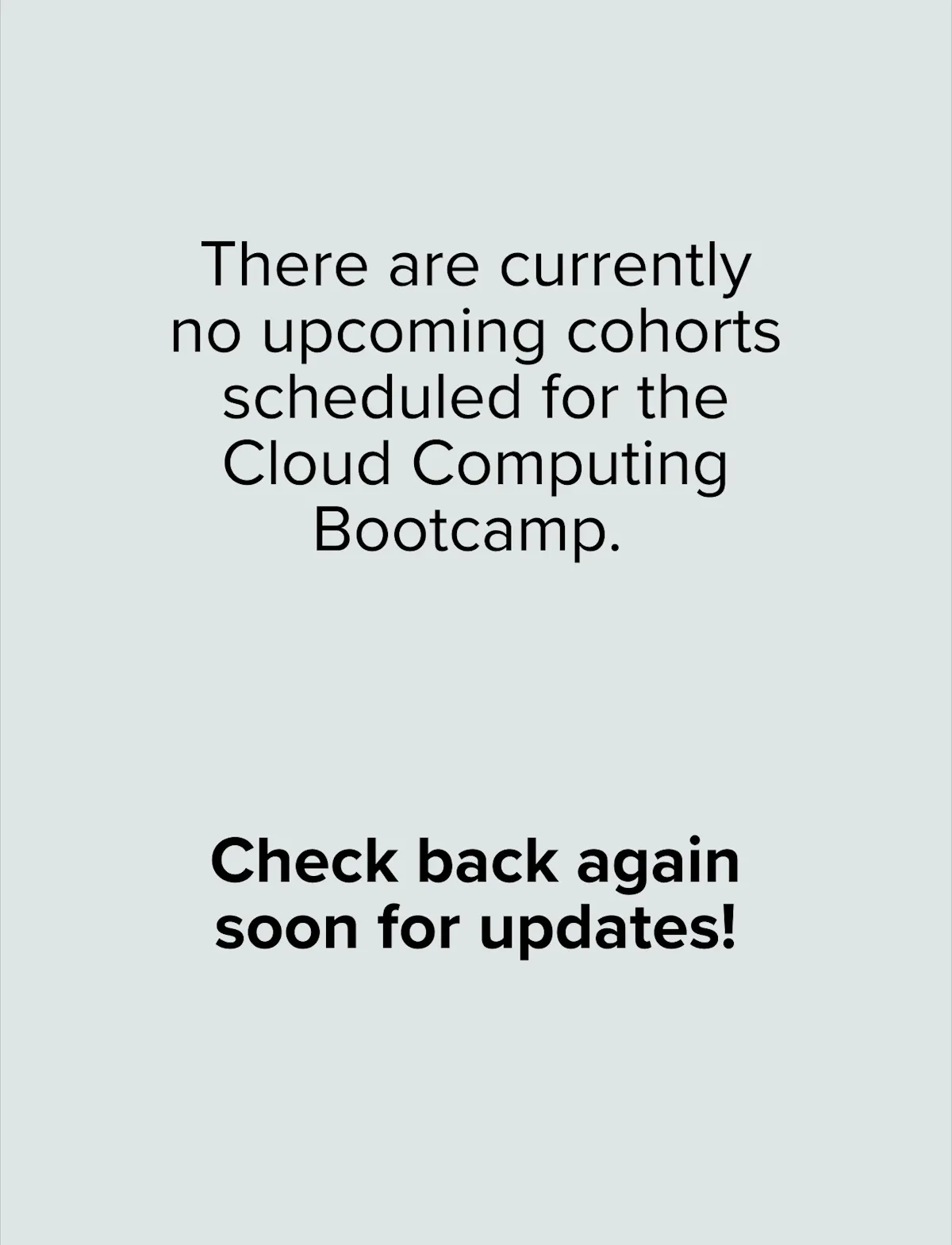How the Virginia Tech Cloud Computing Bootcamp Works
Our cloud computing program is designed for students to pursue high-quality tech education while continuing to balance work or other commitments. Our program provides you with the flexibility to fit career development into your life.
Bootcamp classes combine live online instruction taught by industry-experienced professionals with independent learning assignments.
-
All classes are held on Tuesdays and Thursdays, with an (optional) lab on Wednesdays each week to provide students with additional learning and peer support.
7:30pm-10:30pm ET
The Wednesday lab corresponds with the start time of your regular classes. Participation in the weekly lab is optional, but strongly encouraged.
In addition to classroom lessons, part-time students can anticipate spending 10-15 hours studying and working on outside assignments each week.
Class time options vary by month and are subject to change. To see available class times for your cohort of choice, complete your application or schedule a call with a student advisor.
Tuition
There are many ways to pay for your bootcamp experience, including self-pay, employer-pay, local/state government assistance, scholarships, and personal loans. Learn more about payment options.
-
Virginia Tech Bootcamps is committed to making tech education more accessible, so we’re reducing the enrollment deposit to $99* (normally $1,000) for a limited time. Get started on your journey before the deposit increases!
Enrollment Deposit -
$1,000$99*
Tuition During Program - $14,396
Total Tuition - $14,495*Offer eligibility: Upon admittance into the program, pay the $99 refundable deposit in full prior to the enrollment date.
-
$500 Community Scholarship
For Virginia Tech alumni, current students, and employees.
$1,000 Military Scholarship**
For active-duty service members and military veterans.
**Valid ID required.
Cloud Computing Roles and Salaries
In the field of cloud computing, there are many career paths to follow based on your skills and experience. Some available jobs include Systems Administrator, Cloud Administrator, Solutions Engineer, Cloud Engineer, and Cloud Architect. When you opt into comprehensive career coaching, you’ll receive the guidance you need to navigate the industry as you search for cloud computing roles. Entry-level Cloud Architects in Virginia earn an average yearly salary of $111,594 (Glassdoor, May 2023), offering a potentially large return on investment for anyone pursuing a cloud computing education.
Big Return on Your Investment
The Demand for Cloud Computing Professionals
Now is a great time to start or upskill a career in cloud computing. Despite industry growth, there is a shortage of cloud computing professionals in the US, providing many opportunities for individuals with the skills employers are seeking. Grand View Research reports the global cloud computing market size is expected to reach $1.25 trillion by 2028, growing at a compound annual growth rate of 14.1% from 2021 to 2028. According to Lightcast™, job postings for cloud computing roles have increased by 25% annually over the past five years.
In Virginia alone, companies are hiring cloud administrators at all levels of experience—for both local and remote jobs. There are currently over 4,700 open Cloud Administrator roles in Virginia (LinkedIn, March 2023). Businesses of all industries are actively seeking cloud computing professionals, including local employers like Booz Allen Hamilton, CACI International, and General Dynamics Information Technology.
These companies are hiring for roles like Cloud Administrator, Solutions Engineer, Cloud Engineer, and Cloud Architect. With an inclusive, rigorous active learning curriculum and professional career coaching services, Virginia Tech Cloud Computing Bootcamp students are equipped with the skills they need to achieve fulfilling careers in these types of roles.
What You Will Learn
As part of the curriculum, students acquire the skills and knowledge to navigate cloud computing complexities, including learning about fundamental concepts and gaining experience with popular platforms like Microsoft Azure and Amazon Web Services (AWS). Students will also:
Analyze different types of Azure and AWS services and features
Explore security and compliance measures
Learn how to make infrastructures scalable, reliable, and highly available
Discover networking and content delivery methods
Develop solutions for authentication, authorization, logging, monitoring, migrations, back-ups, and recovery
And much, much more!
Each cloud computing course is facilitated by an instructor in a live online format. The curriculum teaches practical and technical skills using real-world scenarios, the latest technology, and hands-on projects.
Experience using multiple cloud computing platforms will help students stand out in the job market. Students can choose to opt into additional coaching support and receive guidance in resume and LinkedIn optimization, interview preparation techniques, networking guidance, and much more for up to a year following graduation.
-
Orientation
AWS course introduction
Cloud concepts overview
Cloud economics and billing
AWS global infrastructure overview
Cloud security
Networking and content delivery
Compute, storage, and databases
Cloud architecture
Automatic scaling and monitoring
-
AWS Academy Cloud architecting introduction
Adding storage, computing, and database layers
Creating a networking environment
Connecting networks
Securing user and application access
Implementing elasticity, high availability, and monitoring
Automating architecture
Caching content
Building decoupled architectures
Constructing microservices and serverless architectures
Planning for disaster
Bridging to certification
-
Introduction to Azure fundamentals, core services, and resources
Azure storage services
Core solutions and management tools on Azure
Azure networking services
General security and network security features
Identity, governance, privacy, and compliance features
Azure cost management and Service Level Agreements
-
Manage Azure identities and governance
Implement and manage storage
Deploy and manage Azure compute resources
Configure and manage virtual networking
Monitor and backup Azure resources
-
Design a governance solution
Create authentication solutions
Build authorizations
Develop a solution for logging and monitoring
Design for high availability
Construct a solution for backup and recovery
Build a solution for relational and non-relational data
Design data integration
Create a compute solution
Implement an application architecture
Craft a network solution
Design migrations
Cost optimization design
Capstone
Along with the classroom sessions, students can attend a weekly lab where they can review key concepts, catch up on homework, and work alongside peers.
Certifications
The Virginia Tech Cloud Computing Bootcamp can also help you prepare for industry-recognized certifications. With bootcamp preparation and additional studying, you’ll be equipped to take the exam for the:

AWS Certified Cloud Practitioner Certification: This certification helps organizations identify talent with critical knowledge related to implementing cloud initiatives and validates cloud fluency and foundational AWS knowledge.

AWS Certified Solutions Architect Certification: With this certification, you demonstrate your understanding of the AWS Well-Architected Framework, as well as cost and performance optimizations.
Microsoft Azure Fundamentals Certification: This certification verifies that you have a basic understanding of cloud computing and how Azure provides those services.
Microsoft Azure Administrator Associate Certification: This certification exam will evaluate your Azure technical skills. This includes your ability to manage identities and governance, implement and oversee storage, and deploy and direct compute resources.
Designing Microsoft Azure Infrastructure Solutions: This certification exam assesses your ability to design identity, governance, monitoring, data storage, business continuity, and infrastructure solutions.
Exam costs for the AWS or Microsoft Azure certification examinations are not included in the program tuition.
Train with the Virginia Tech Cloud Computing Bootcamp, then earn these cloud computing certifications.
Landing a Cloud Computing Job in Virginia
Virginia Tech students will gain valuable insight into how to build a successful career in cloud computing from day one of the course. Throughout the bootcamp experience, students may access live workshops, office hours, and on-demand content to help build a job search toolkit—which includes an optimized resume and LinkedIn profile.
Following successful completion of the Career Success Program, students can choose to opt into additional coaching support and receive guidance for up to a year following graduation in:
Growing your professional network
Resume and LinkedIn profile optimization
Interview and assessment prep
Salary negotiation workshops
And much more!
You’ll also graduate from the program with a portfolio of work that demonstrates your ability to solve real business problems for real companies.
Fullstack Academy grads have landed jobs with some of the world's leading companies.
Virginia Tech Bootcamps are powered by Fullstack Academy. The companies listed above have hired Fullstack Academy graduates.
Who Should Attend
The Virginia Tech Cloud Computing Bootcamp is specifically designed for beginners. There’s no experience required to apply, be accepted, or succeed.
Successful bootcamp students have backgrounds in:
Business
Computer Science
Finance
Information Technology
Software Engineering
Customer service
Admin
And more...
FAQs
-
The Virginia Tech bootcamp is one of the most comprehensive online cloud computing training programs in the U.S. The immersive curriculum provides:
Hands-on learning
Over 40 interactive labs and activities
Industry-experienced instructors
Career coaching
Certification preparation
And more!
Plus, the bootcamp is powered by Fullstack Academy, one of the longest-running and most reputable bootcamp providers in the nation.
-
The cloud computing curriculum is broken up into five units and guides you all the way from foundational concepts to advanced skills. The units are:
AWS Academy Cloud Foundations
AWS Academy Cloud Architecting
Azure Cloud Fundamentals
Implement, Manage, and Monitor on Azure Environment
Designing Infrastructure Solutions on Azure
Plus, you’ll build and expand your professional portfolio. With additional study, you’ll also be able to prepare for industry certifications from AWS and Microsoft Azure. The costs of the exams are not included in our program tuition price.
For the Cloud Computing Bootcamp syllabus, click here and fill out the form.
-
Students enrolled in our cloud computing program will use popular platforms like AWS and Microsoft Azure and learn about:
Non-coding roles
System management
Virtualization
Troubleshooting
Cloud provider selection
Application migration
Performance testing
Cloud workloads
Identity access management
Autoscaling
Disaster recovery
Web services and API
Cloud migration and deployment
Database management
Multi-cloud deployment
Storage services
-
Yes, the Virginia Tech Cloud Computing Bootcamp is beginner-friendly. It’s specifically designed for professionals without previous experience in cloud computing. While some background knowledge is helpful, the only expectation is that students have general computer literacy skills in basics like efficiently using the Internet/cloud and Windows.
-
With the cloud computing program and additional studying, students can prepare to take the following industry-recognized certification exams:
AWS Certified Cloud Practitioner Certification
AWS Certified Solutions Architect Certification
Microsoft Azure Fundamentals Certification
Microsoft Azure Administrator Associate Certification
Designing Microsoft Azure Infrastructure Solutions
Certification is not required to graduate, and exam vouchers are not included in bootcamp tuition.
-
Your time with our career success team will include everything from workshops to one-on-one office hours to phone chats before big interviews. Alumni will also have access to a job board and have the opportunity to be connected with companies and organizations in our Employer Partner Network that are actively hiring.
-
You do need to provide your own computer for the bootcamp. It can be a laptop or desktop as long as it meets the minimum machine specifications of your chosen program. Because the bootcamp is live online, you are required to have a webcam and microphone to participate in class.
Ensuring you have a computer that meets the requirements for your course is an essential part of setting yourself up for success in our bootcamps.
For full computer requirements for each of our program offerings, visit our Online Learning page. -
Many of our part-time students continue working full-time while completing their bootcamp. Each week, students can expect to spend 6 hours in class and another 10-15 hours studying and completing assignments outside of class.
Ready to Start Learning?
Once you’re ready to start your cloud computing journey, here are the steps you can expect in the admissions process.
Fill out our online application form
- Take our nontechnical assessment
No cloud computing experience required
Covers logical reasoning
Sent to you immediately upon submission of application
Receive an entrance decision







